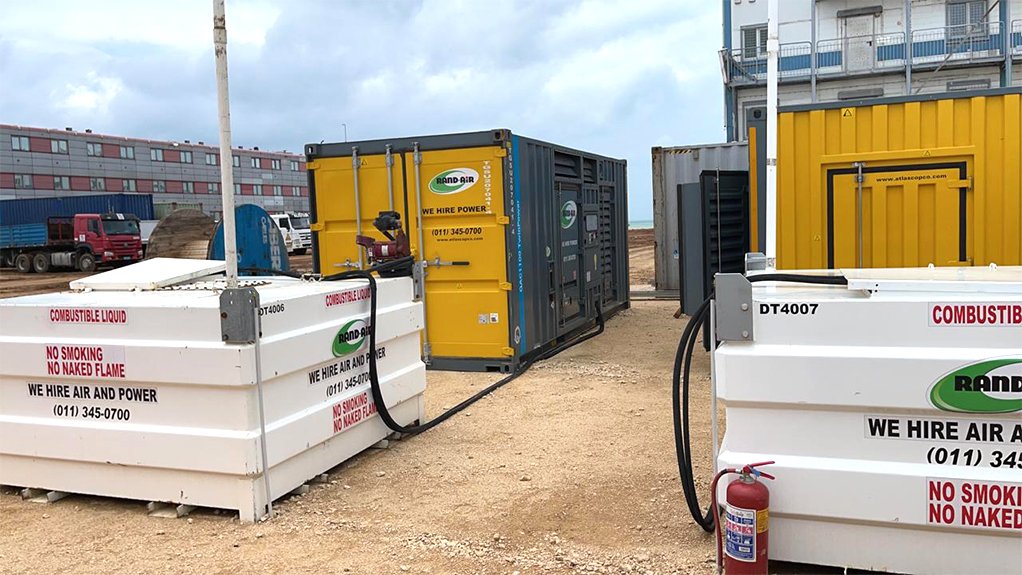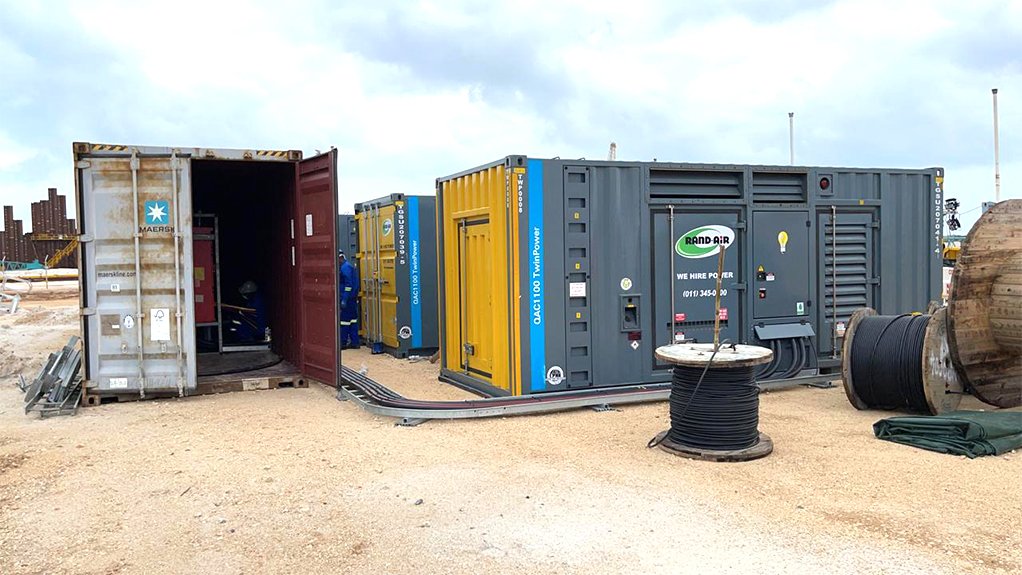Many local manufacturers still do not have backup power installed, while others lack adequate power solutions to effectively limit the production losses incurred during power outages or load-shedding, says power rental expert Rand-Air, part of the Atlas Copco group.
“A lot of companies do not have the right equipment on site to keep their lights on, with some only powering their offices or the critical part of their manufacturing facility to keep certain materials agitated, for example,” explains Rand-Air inland area manager Henry Fourie.
Most local companies consider only the production loss and fail to see that this is not the only loss incurred when they operate without backup power, he says.
“The knock-on effect of not having power is significant. A power outage amid the manufacturing process can result in the loss of materials and there is also the significant financial loss associated with labour when a factory grinds to a halt. The loss of production also reduces product availability and, ultimately, results in unhappy customers.”
The capital cost involved in buying and installing a generator is a key factor in a company’s decision to invest in a specialised standby power system with the correct controls and protections to prevent damage to expensive manufacturing equipment and effectively operate a plant.
Procuring a generator is a grudge buy for manufacturers because it involves a sizeable investment, from R1.2-million to R2-million, in equipment that might be used only five or six times a year, states Fourie.
“While some companies may use their generators more often, what is the return on their R2-million investment at the end of the day? Investing in a generator is seen as dead capital on the days the equipment isn’t running.”
Running costs are also increasing with the rising fuel price, with Fourie noting that buyers are “digging deeper” into the specifications of generators and their fuel consumption.
As a result, Rand-Air is rolling out the ZBC battery storage unit equipped with lithium-ion batteries, which works in conjunction with its generators or in isolation to improve fuel consumption.
The battery storage unit can be programmed to take over from the generator, which will either switch off or run at a lower load during low demand periods to reduce the customer’s fuel bill.
In South Africa, this hybrid solution is advantageous during peak demand when manufacturers can easily exceed their baseline power consumption and run the risk of being penalised.
Rental Option Benefits
The capital involved in buying a generator could rather be used to add value to an operation by investing in equipment to ramp up daily production and improve on processes, says Fourie.
As demand for standby power is seasonal, he suggests renting a generator over winter, when load-shedding is at its worst, instead of buying a generator that will be used for only four months of the year.
“You are conserving capital by hiring a generator and limiting your exposure to the risks of owning the machine,” elaborates Fourie, adding that customers often turn to Rand-Air for urgent rentals when their generators break down.
As generators are not used daily, their upkeep is often neglected, with original-equipment manufacturer service level agreements to maintain a generatoran additional cost, he highlights.
When hiring a generator, it is the responsibility of the rental company, such as Rand-Air, to replace it when it breaks down and undertake all the necessary maintenance.
Rand-Air technicians are on site once a month to do the necessary preventive maintenance and ensure standby generator rentals are functioning correctly. However, where generators are operating at projects around the clock, Rand-Air technicians are on site for the duration of the rental period.
“We are rolling out remote monitoring across our generator fleet worldwide to reduce downtime. This will enable us to have sight of all alerts sent out by a generator so that we can be on route to site before the customer even knows anything is wrong,” advises Fourie.
Rand-Air is installing a condition monitoring system on its Atlas Copco QAC TwinPower 1 100 kVA generators and is aiming to conclude the installation across its local fleet by the end of next year.
Replacing an ageing generator fleet with the latest technology comes at a substantial cost, and not all companies have the financial capacity to do so, he says.
Rand-Air constantly monitors the condition of its fleet to ensure that its generators remain in a reliable condition after being hired. Being part of the Atlas Copco group, Rand-Air can replace its old generator sets yearly with the latest available technology.
The company offers customers a 24/7 service and, should a generator fail unexpectedly, a technician will generally be on site in two hours, depending on the location. If the machine is irreparable, the company will arrange for an exchange unit to be delivered to site, regardless of the time.
“We need to ensure uptime of our rentals so that we can earn revenue,” explains Fourie.
Edited by: Zandile Mavuso
Creamer Media Senior Deputy Editor: Features
EMAIL THIS ARTICLE SAVE THIS ARTICLE
ARTICLE ENQUIRY
To subscribe email subscriptions@creamermedia.co.za or click here
To advertise email advertising@creamermedia.co.za or click here















